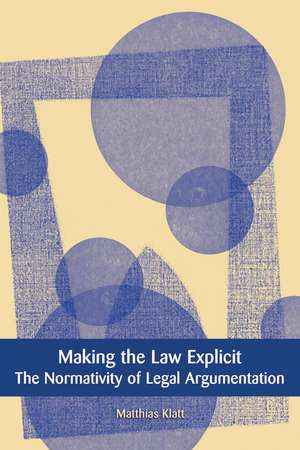Making the Law Explicit: The Normativity of Legal Argumentation: European Academy of Legal Theory Series
Autor Matthias Klatten Limba Engleză Hardback – 7 sep 2008
Din seria European Academy of Legal Theory Series
- 7%
 Preț: 348.20 lei
Preț: 348.20 lei - 23%
 Preț: 199.83 lei
Preț: 199.83 lei - 23%
 Preț: 179.10 lei
Preț: 179.10 lei - 17%
 Preț: 329.64 lei
Preț: 329.64 lei - 23%
 Preț: 236.19 lei
Preț: 236.19 lei - 30%
 Preț: 716.07 lei
Preț: 716.07 lei - 14%
 Preț: 568.71 lei
Preț: 568.71 lei - 30%
 Preț: 569.53 lei
Preț: 569.53 lei - 31%
 Preț: 771.42 lei
Preț: 771.42 lei - 30%
 Preț: 539.42 lei
Preț: 539.42 lei - 30%
 Preț: 602.50 lei
Preț: 602.50 lei - 30%
 Preț: 540.80 lei
Preț: 540.80 lei - 14%
 Preț: 566.78 lei
Preț: 566.78 lei - 22%
 Preț: 237.02 lei
Preț: 237.02 lei - 22%
 Preț: 237.10 lei
Preț: 237.10 lei - 22%
 Preț: 249.91 lei
Preț: 249.91 lei - 19%
 Preț: 303.06 lei
Preț: 303.06 lei - 30%
 Preț: 509.45 lei
Preț: 509.45 lei
Preț: 542.02 lei
Preț vechi: 774.98 lei
-30% Nou
Puncte Express: 813
Preț estimativ în valută:
103.71€ • 108.58$ • 85.82£
103.71€ • 108.58$ • 85.82£
Carte disponibilă
Livrare economică 15-29 martie
Preluare comenzi: 021 569.72.76
Specificații
ISBN-13: 9781841134918
ISBN-10: 1841134910
Pagini: 256
Dimensiuni: 156 x 234 x 20 mm
Greutate: 0.64 kg
Ediția:New.
Editura: Bloomsbury Publishing
Colecția Hart Publishing
Seria European Academy of Legal Theory Series
Locul publicării:London, United Kingdom
ISBN-10: 1841134910
Pagini: 256
Dimensiuni: 156 x 234 x 20 mm
Greutate: 0.64 kg
Ediția:New.
Editura: Bloomsbury Publishing
Colecția Hart Publishing
Seria European Academy of Legal Theory Series
Locul publicării:London, United Kingdom
Caracteristici
This book breaks new ground in transferring Brandom's philosophy to legal theoretical problems and presents an original and exciting analysis of the semantic argument in legal argumentation. Recipient of the European Award for Legal Theory, 2002.
Notă biografică
Matthias Klatt is Juliana Cuyler Matthews Junior Research Fellow in Law at New College, Oxford University.
Cuprins
Introduction 1I. The Doctrine of the Limits of the Wording II. Interpretation and Invention in English Legal Reasoning III. Towards a Common European Approach IV. The Possibility of the Rule of Law Defended V. The Sceptical Challenge: Indeterminacy and Vagueness VI. The Rationality and Objectivity of Legal Reasoning VII. At a Glance Chapter 1: The Doctrine of the Limits of the Wording I. The Limits of the Wording in Hermeneutic Legal Theory II. The Limits of the Wording in Analytic Legal Theory III. The Deconstructivistic Challenge of the Structuring Legal Theory IV. The Results of the First Chapter Chapter 2: Normativity and Objectivity of Linguistic Meaning I. Introduction II. The Normativity of Linguistic Meaning III. The Objectivity of Linguistic Meaning IV. The Results of the Second Chapter Chapter 3: Semantic Normativity in the Law I. Addressing the Three Central Issues II. The Theory of the Limits of the Wording III. The Results of the Third Chapter
Descriere
This book considers Robert Brandom's philosophy and presents an original and exciting analysis of the semantic argument in legal argumentation.
